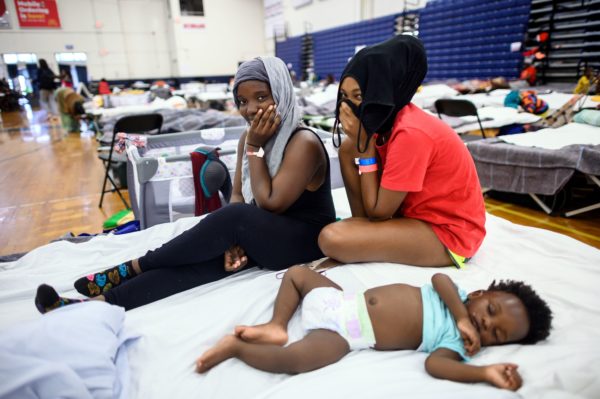The rising numbers of African migrants seeking asylum in the United States overwhelmed a Maine basketball arena this summer and now, the people there have found homes thanks to local families in Maine. But it’s not all easy for migrants.
At its peak in June, the Portland Expo arena in Maine’s largest city, Portland, was home to 300 asylum seekers who trudged through Central Ameria to the U.S. Thursday, August 15 marked the deadline in which the hundreds of families who lived at the venue had to move out, The Associated Press reported. According to WGME, close to 450 migrants had come to Portland, Maine in search of refuge. As the deadline drew near for Expo-dwelling families to find other homes, more host families began temporarily housing refugees in towns north of Portland. Such families are located in Bath, Brunswick and Lewiston.

The move comes a week after at least two children at the facility were diagnosed with chickenpox, the local ABC station reported.
“We’ve had over 107 families go through the full application process, which has been an incredible showing of generosity,” Kristina Egan of the Greater Portland Council of Governments said to WGME Thursday. “And as of yesterday, we have 35 asylum-seeking families placed with host homes throughout the region, and today we have another seven moves planned.”
Jessica Grondin, the spokesperson for the city, said Portland had donations of more than $900,000 raised to not only go toward recovering costs from the Expo but also support the migrant families, who hail from countries such as Congo and Angola.
Additionally, a general assistance program has been newly opened by the city. The AP reported families can rely on it for vouchers to use on food, medicine and housing. The reason being is that emigrants are disallowed from working for a 180-day period as they seek asylum from their home countries.
But with the housing being located in heavily-wooded areas iconic to the state, many asylum seekers have been triggered, recalling the harrowing journey they took from Central America to the U.S. Some remembered seeing fellow asylum seekers’ lives claimed by the perils of the Panamanian jungle Darién Gap, which included falling to their deaths or dying of starvation.
“We are really thankful and appreciative. Really, God bless you,” Congo native Thierry Malasa told the AP through an interpreter. “But we also want you to understand what it was like in the forest. There were people who went with us who died. We don’t want to go again to a spot like that. It’s just too difficult.”
Lidia Maria Afonso, who resided in Luanda, Angola, said through an interpreter that her three children are scarred from what they witnessed.
“By the grace of God, my family made it here. But the kids still have that stuff in their brains,” she said.


